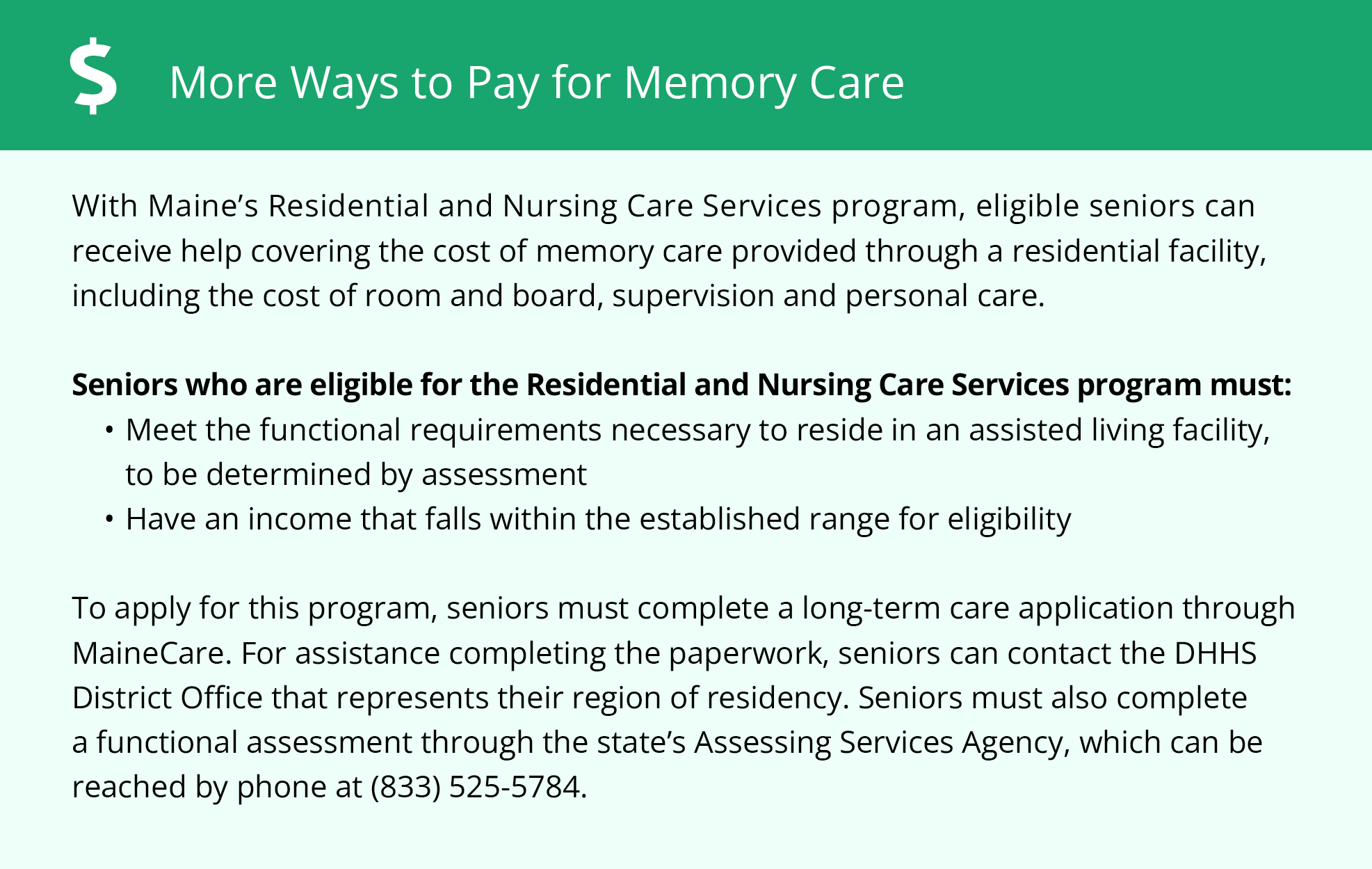Memory Care Facility Charlotte Things To Know Before You Get This
Memory Care Facility Charlotte Things To Know Before You Get This
Blog Article
Memory Care Facility Charlotte Fundamentals Explained
Table of ContentsMemory Care Facility Charlotte Things To Know Before You Get ThisMemory Care Facility Charlotte Things To Know Before You BuyMemory Care Facility Charlotte - TruthsThe Memory Care Facility Charlotte StatementsThe Buzz on Memory Care Facility Charlotte
The expense of Alzheimer's care in assisted living areas is around 20-30% more. Many do not charge in addition since somewhat these individuals do not require more care than other nursing home homeowners.State daily standards vary from $220 $1,137 a day. Sharing a residence lowers the price to 10-20% of that for a private area. Sharing a room is not constantly an option for persons with hostile kinds of dementia. See each states' typical nursing home treatment prices. Adult preschool, like retirement home, commonly do not charge added fees for people with Alzheimer's or dementia.
For most family members, the costs of caring for an enjoyed one with Alzheimer's or mental deterioration are covered not by a solitary resource, yet rather by contributions from a variety of resources. Medicare, like the majority of health and wellness insurance policy, does not distinguish Alzheimer's and dementia treatment from various other conditions such as heart illness.
Medicare will pay for 100% of the cost of nursing home treatment if it is clinically needed for 20 days and 80% of the price for an extra 80 days. If an individual with Alzheimer's calls for care in a psychiatric hospital, Medicare enhances the variety of days they will offer help approximately 190 days
The 7-Minute Rule for Memory Care Facility Charlotte
Medicare does not pay for custodial or individual treatment that is offered in an assisted living house. The same uses for home care and adult day treatment.
There is an exemption to this for individuals receiving hospice care in the house. Medicare will pay for housewife solutions, that includes individual assistance for individuals determined to be in the final 6 months of their life. Memory Care Facility Charlotte. Medigap plans, or Medicare Supplementary Insurance Policy, does not specifically offer fringe benefits for Alzheimer's clients
As an example, these plans normally pay the 20% of the expense of retirement home care that Medicare does not pay. New in 2019, Medicare Advantage (MA) strategies have the ability to offer some long-term treatment services and supports as a supplemental health advantage, given they: Make up for physical impairmentsDiminish the impact of injuries or health and wellness conditionsReduce avoidable emergency space use Instances of potentially available benefits, which can be very crucial for individuals with Alzheimer's, consist of: Grown-up day careHome adjustments (mobility device ramps, get hold of bars)Individual emergency situation reaction systemsRespite carePersonal care assistanceHomemaker servicesMeal delivery In 2020, MA plans are further expanded their supplemental advantages to aid chronically unwell individuals.
3 Easy Facts About Memory Care Facility Charlotte Described
The requirement being that with the invoice of advantages, the care recipient has a suitable opportunity of renovation in health or functioning, or a minimum of maintaining the same level of wellness and operating. The new benefits can be tailored to the certain requirements of MA plan enrollees. A senior with Alzheimer's condition may be able to receive straying support solutions.
Very couple of, need a particular medical diagnosis of Alzheimer's or mental deterioration. Rather, they think about one's capacity or lack of ability to care for themselves by accessing their capacity to execute their tasks of everyday living. From a functional point of view, mid to late stage Alzheimer's individuals commonly qualify for Medicaid benefits quite quickly.
While not specifically developed for Alzheimer's individuals, considered that many Alzheimer's client are not functioning, have reduced earnings and require daily aid, it is relatively common for these people to get these programs. See a complete listing of state non-Medicaid assistance programs. In enhancement to the much more general help programs, numerous states have programs created specifically for people with Alzheimer's, dementia or related problems.
Some Known Facts About Memory Care Facility Charlotte.
 They just require a medical diagnosis of Alzheimer's, mental deterioration or various other associated memory problem to get the program. Learn More Here Respite care is momentary support supplied to the primary caregiver to enable them a break from taking care of an individual with Alzheimer's or mental deterioration. It can be offered in the home, in an adult preschool, or in some cases in an assisted living house or various other household setting.
They just require a medical diagnosis of Alzheimer's, mental deterioration or various other associated memory problem to get the program. Learn More Here Respite care is momentary support supplied to the primary caregiver to enable them a break from taking care of an individual with Alzheimer's or mental deterioration. It can be offered in the home, in an adult preschool, or in some cases in an assisted living house or various other household setting.There are several organizations and programs offering reprieve care solutions. It is worth visite site keeping in mind that most of the times these are home treatment firms offering home treatment and advertising and marketing it as reprieve care although they are charging the complete per hour rate. There are also federally financed programs that offer lowered rate or totally free reprieve treatment, such as the Life Expectancy Respite Care, the National Family Caretaker Assistance Program, along with programs particular to individual states including Florida's Task R.E.L.I.E.F., New Jacket's Statewide Break Care, and Connecticut Statewide Respite Treatment Program.
The Alzheimer's Foundation of America provides "Family Reprieve Care Grants" by moneying neighborhood, non-profit, participant organizations. These participant companies work straight with the households to administer the grants. It is worth keeping in mind that neighborhood organizations sometimes incorporate funds with other sources. As a result the name "Household Respite Care Grants" might not constantly be made use of.
Extremely few, call for a specific diagnosis of Alzheimer's or mental deterioration. Instead, they think about one's capacity or inability to take care of themselves by accessing their ability to perform their activities of everyday living. From a useful perspective, mid to late phase Alzheimer's individuals typically get approved for Medicaid advantages rather conveniently. To find out more on Medicaid useful content and each state's waivers, please use the complying with links: General Medicaid, Home Care Waivers, Aided Living Waivers, Grown-up Daycare Waivers, and Grownup Foster Care Waivers.
The Definitive Guide for Memory Care Facility Charlotte
While not particularly developed for Alzheimer's people, considered that numerous Alzheimer's client are not functioning, have low revenues and call for daily assistance, it is fairly typical for these people to qualify for these programs. See a total listing of state non-Medicaid aid programs. In addition to the more generalized assistance programs, several states have programs created specifically for individuals with Alzheimer's, dementia or associated problems.
 They merely need a medical diagnosis of Alzheimer's, mental deterioration or various other relevant memory problem to certify for the program. Break treatment is momentary support given to the key caregiver to allow them a break from taking care of a private with Alzheimer's or dementia. It can be supplied in the home, in an adult day care facility, or sometimes in an assisted living residence or various other domestic setup.
They merely need a medical diagnosis of Alzheimer's, mental deterioration or various other relevant memory problem to certify for the program. Break treatment is momentary support given to the key caregiver to allow them a break from taking care of a private with Alzheimer's or dementia. It can be supplied in the home, in an adult day care facility, or sometimes in an assisted living residence or various other domestic setup.There are many various organizations and programs providing break treatment services. It is worth keeping in mind that oftentimes these are home treatment firms marketing home care and advertising and marketing it as break care despite the fact that they are charging the full hourly rate. There are also government funded programs that provide lowered rate or cost-free break treatment, such as the Lifespan Respite Care, the National Family Members Caretaker Support Program, along with programs particular to specific states consisting of Florida's Job R.E.L.I.E.F., New Jersey's Statewide Respite Care, and Connecticut Statewide Break Care Program.
The Alzheimer's Foundation of America provides "Family members Respite Care Grants" by moneying regional, non-profit, member companies. These participant companies function directly with the families to administer the gives. It deserves noting that regional companies sometimes integrate funds with various other resources. The name "Family members Respite Care Grants" might not always be utilized.
Report this page